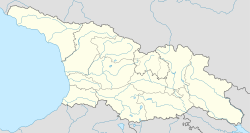
Summary
Chkhalta (Georgian: ჩხალთა; Abkhaz: Чҳалҭа; Russian: Чхалта) is a village in the upper part of the Kodori Valley, situated in Gulripshi District, Abkhazia, a breakaway republic from Georgia.
Chkhalta
| |
|---|---|
 The House of the Government of Abkhazian Autonomous Republic, Azhara, Upper Abkhazia | |
 Chkhalta Location of Chkhalta in Abkhazia  Chkhalta Chkhalta (Georgia) | |
| Coordinates: 43°05′48″N 41°40′24″E / 43.09667°N 41.67333°E | |
| Country | |
| Partially recognized independent country | |
| District | Gulripshi |
| Time zone | UTC+3 (MSK) |
| • Summer (DST) | UTC+4 |
History edit
Chkhalta is considered to be "Tsakhar" of the Byzantine sources by a considerable number of scholars. Here, in 556, the battle took place between the Byzantine army and rebellious Misimians, a local proto-Georgian tribe. The Missimians revolted during the Lazic War against the Byzantine rule and sided with the Sasanian Empire, but the Sasanians could offer no help as they were defeated by the Byzantine army at Phasis (Poti). Misimian rebels fortified themselves in the fortress of Tsakhar, but they were defeated by the Byzantine army. The Misimians continued to fight, but ultimately the revolt was supressed.[2]
Prior to August 2008, Chkhalta was part of 'Upper Abkhazia', the only part of the region controlled by the Georgian government after the 1992–1993 War in Abkhazia. During the August 2008 Russo-Georgian war, Abkhaz separatists gained control of Chkhalta and the rest of Upper Abkhazia.[3] Most of Chkalta's inhabitants fled the advancing troops and have yet to return.
See also edit
References edit
- ^ The political status of Abkhazia is disputed. Having unilaterally declared independence from Georgia in 1992, Abkhazia is formally recognised as an independent state by 5 UN member states (two other states previously recognised it but then withdrew their recognition), while the remainder of the international community recognizes it as as de jure Georgian territory. Georgia continues to claim the area as its own territory, designating it as Russian-occupied territory.
- ^ Georgian Soviet Encyclopedia (PDF) (in Georgian). Vol. 11. Tbilisi: Metsniereba. 1987. p. 265.
- ^ [1]


